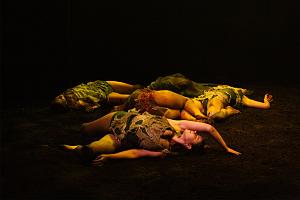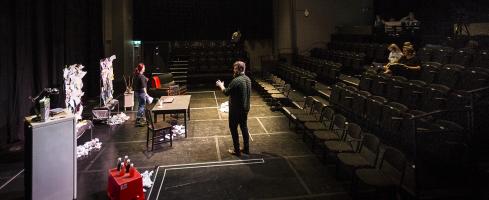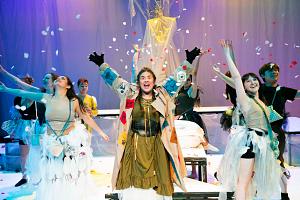BA (Hons)
Drama and Theatre Arts with Acting
Content navigation menu
Why study BA Drama and Theatre Arts with Acting at Goldsmiths
Train as an actor and artist in your own right. Experience and enjoy a wide range of roles alongside opportunities to direct, write and produce.
- You'll learn to become an ‘actor-plus’: developing confidence as an actor while being given access to other skills such as directing, writing and producing.
- Studying with us will enable you to work in the theatre and screen industries and equip you to create, innovate, and initiate change, in your own right as an artist.
- Goldsmiths is famous for producing theatre practitioners who have agency and critical capacity.
- Your learning experience will benefit from recent developments and diversification in the models and methods of actor training and ethics that we have been exploring on BA Drama and Theatre Arts at Goldsmiths, and now with an expanded practice in Acting skills.
- There will be classes in rehearsal ethics, characterisation and ensemble skills, movement, voice, stage, screen and audio genres, text-based and devised work.
- Our training assists you in achieving excellence and avoids erasing aspects of your identity in the process of training such as race, ethnicity, sexuality, class, regional accent or disability.
Contact the department
If you have specific questions about the degree, contact Alexa Reid.
UCAS code
W410
Entry requirements
A-level: BBB
BTEC: DDM
IB: 33 points overall with Three HL subjects at 655
Length
3 years full-time, 6 years part-time
Fees
Home - full-time: £9535
International - full-time: £21200
Department
Opportunities for you
- Goldsmiths is a small and welcoming university which provides the caring setting needed for training in acting, combined with a long history of intellectual and creative risk-taking and thoughtful questioning of how and why we train in certain ways.
- The Acting Pathway has been designed to work smoothly alongside the other Drama and Theatre Arts programmes so that your skills and imagination will benefit from being among peers with different specialisms in theatre and wider creative interests.
- The programme offers an introduction to working in screen, audio and digital contexts and you learn about performance theories, practices and methodologies in relation to your own performance practice and research.
- You'll benefit from the dynamic environment of Goldsmiths within reach of the imaginative and theatrical stimulus of London’s cultural and creative locations.
Academic support
- You'll be allocated a Personal Tutor from your programme of study who has overall responsibility for your individual progress and welfare.
- Support for your learning and wellbeing is provided in a number of ways by your course and also by College support services, including the Wellbeing, Library Study Skills and Disability Teams.
- You'll have access to a Senior Tutor who can support you with any issues that are negatively impacting your academic study and which are beyond the normal scope of issues handled by Programme Directors and Personal Tutors.
Watch videos about your course
What you'll study
In your first year, you will take the following compulsory modules:
| Module title | Credits |
|---|---|
| Ideas in Practice | 15 credits |
| Character, Modes and Forms I | 15 credits |
| Creative-Critical Project | 15 credits |
| Character, Modes and Forms II | 15 credits |
| Theatre Making 1 | 30 credits |
| The Ensemble | 15 credits |
| Reflexive Practitioner I: Self-Pedagogy | 15 credits |
Teaching Style
You will be taught on campus through face-to-face teaching. The department believes in maintaining a range of learning contexts that facilitate a wide variety of modes of learning and teaching at all levels including, lectures, seminars (with group research and presentations), practical sessions, workshops, supervised, student-led and/ or independent rehearsals, opportunities for guided and peer-assisted learning especially in production development, and visits to professional theatres.
How you'll be assessed
You will be assessed through a variety of methods, including essays, formal written examinations, practical projects, workshops, group performances, assessed rehearsals, group practice presentations as well as full productions, independent research projects, portfolios, and seminar presentations.
Fees and funding
Annual tuition fees
These are the UG fees for students starting their programme in the 2025/2026 academic year.
- Home - full-time: £9535
- International - full-time: £21200
If your fees are not listed here, please check our undergraduate fees guidance or contact the Fees Office, who can also advise you about how to pay your fees.
It’s not currently possible for international students to study part-time if you require a Student Visa, however this is currently being reviewed and will be confirmed in the new year. Please read our visa guidance in the interim for more information. If you think you might be eligible to study part-time while being on another visa type, please contact our Admissions Team for more information.
If you are looking to pay your fees please see our guide to making a payment.
Additional costs
In addition to your tuition fees, you will be responsible for meeting standard costs associated with your study. Find out more information on our study costs page.
Workshop-based modules which involve performer skills should not incur a cost. However, for any productions, especially in final year work, there may be costs related to personal items, such as make-up, extra clothing (beyond our costume department’s range). These will be managed in accordance with similar programme expenses, where we will reasonably cover a range of expenses to a capped amount per student.
Entry requirements
We accept the following qualifications:
A-level: BBB
BTEC: DDM
International Baccalaureate: 33 points overall with Three HL subjects at 655
UAL Extended Diploma: Merit overall
Access: Pass with 45 Level 3 credits including 30 Distinctions and a number of merits/passes in subject-specific modules
Scottish qualifications: BBBBC (Higher) or BBC (Advanced Higher)
European Baccalaureate: 75%
Irish Leaving Certificate: H2 H2 H2 H2
If you can't find your qualification here, then please visit our entry requirements page for a list of alternative qualifications.
Additional requirements
Your qualifications must include a minimum Grade B in English Literature, English Language and Literature, Drama or Theatre Studies, or another humanities discipline. General Studies is not accepted as one of the three A-levels.
Alternative qualifications and experience
See our full list of undergraduate entry qualifications.
We welcome students with a range of educational experiences. If you believe you may not meet the standard qualification requirements we would still encourage you to apply because we consider all aspects of your application when making a decision.
We’ll pay particularly careful attention to your personal statement, which is your opportunity to demonstrate your interest in the subject you’ve applied for. Your referees are also welcome to include any relevant contextual comments around your academic achievements. We’ll look at all these things when making a decision on your application, as well as your qualifications and grades, and may still be able to offer you a place.
International qualifications
We also accept a wide range of international qualifications. Find out more about the qualifications we accept from around the world.
If English isn’t your first language, you will need an IELTS score (or equivalent English language qualification) of 6.0 with a 6.0 in writing and no element lower than 5.5 to study this programme. If you need assistance with your English language, we offer a range of courses that can help prepare you for degree-level study.
Facilities
The Department of Theatre and Performance delivers teaching in five theatre studios and houses the technically-supported George Wood Theatre. Further facilities include a voice recording booth, media editing suite, scenographic workshop areas and a costume design studio. Find out more about our facilities.




